- Home
- Sean Platt
Jumper: Books 1-6: Complete Saga Page 13
Jumper: Books 1-6: Complete Saga Read online
Page 13
She raises her gun. “You’re not stopping me.”
“Stopping you from what?”
I move my hand from my belt, away from the Taser, letting her know I’m not a threat.
She looks me up and down, takes a step closer, though not close enough for me to try wresting the gun away, even if I’m fast enough.
“Don’t play dumb. You’re not saving him. He needs to die.”
“I’m serious. I don’t know what’s going on. I heard the voices and came here.”
Her eyes widen as she takes another step toward me.
“Wait, you’re not one of them?”
She reaches out and touches my skin. A rush of images floods my mind, too fast to decipher.
Her jaw drops.
“Oh, my God. It’s … you.”
I wait to see if she’ll offer a name — I’m not about to tell her.
She lowers the gun. “They’ve been looking for you.”
Lightning cracks, blinding white accompanied by the boom of thunder.
“Who is looking for me? I can’t remember anything.”
“Nothing?”
“No. I only know I’m waking up in a different body every day or so, but I can’t remember anything before a year ago.”
She’s not freaking out or calling me crazy. It feels like such a relief. Finally, someone I can talk to, and maybe get some answers from.
“So, you’re saying you have no memories at all? None?”
I could tell her that I do have one memory, my name. But something — maybe the gun — tells me not to trust her just yet.
I shake my head. “None.”
She laughs. I’m still not sure if she’s an enemy.
“I’ll tell you more, but first I need you to go. I have a job to do.”
“What kind of job?” I ask, looking at the gun.
“You really don’t remember?”
I shake my head.
“Let’s just say I need to take care of someone. Call it preventative measures.”
Suddenly, the sound of footsteps to our left.
“Put the gun down!”
We both turn to see James standing there, gun — where he got it from I don’t know — in hand, aimed at the woman.
“Shit,” she says.
Before James can react, she fires two shots to his head.
I scream, “What the fuck?”
She looks at me. “Great, now I’ve gotta delay the job.”
“What are you talking about?”
She raises the gun, says, “Sorry, no hard feelings,” and fires.
Chapter Two
I wake up gasping, grateful to be alive, even if in another body.
But I’ve let another person die.
Not “a person.” He has a name — Renaldo Vasquez!
He’d fought so hard to change his life, to be something more than the wretched person he had been before. It was tough, but he was on the right path.
But I screwed it up.
Maybe he’s not dead. I don’t know for certain. Maybe he’s recovering in the hospital.
When I get up, I’ll find a computer and search for his name, see if he pops up in a news story that’ll tell me if he lived.
But I don’t want to get up yet.
I need to lie here for a while and make sense of yesterday.
Who was that woman? How did she know me? And who was she trying to kill?
And why the hell did she shoot me?
But I can’t think now. It feels like a marching band has stomped across my body, echoes of their drums reverberating double time inside my skull.
In other words, I feel like absolute hell, waking up, yet again, in the body of someone who partied too hard the night before. I’m left to suffer the fog of confusion, struggling to find even the slightest motivation to drag this wasted body out of bed.
Today I’m in a forty-three-year-old man named Frank Miller, a warehouse worker at a mall department store, a job he hates almost as much as he loathes his sobriety. A job he’s due to be at — I look at the clock: 7:15 a.m. — in just over an hour. I live on Baker Street, a small cul-de-sac in the ’burbs, where the block’s other nine houses are all newer and nicer than mine. But we’re in a good area, even if Frank doesn’t know a single neighbor.
I’m alone in bed, though I didn’t go to sleep that way. Frank lives with his girlfriend, Stacy — a bookkeeper at a local auto parts distributor. She must be up, maybe getting her son ready for school.
I drag myself to the bathroom, flick on the light, and look at the grizzled face. He’s thin, acne-scarred with severe blue eyes and long, straggly brown hair. He reminds me of a drug dealer or a roadie who parties more often than not.
I try to access last night’s memories, but everything’s fuzzy. Two toxic emotions are still stirring through his brain — rage and shame.
What did you do, Frank Miller?
I step into the shower and turn the hot water on, waiting for the heat to coax some hidden reserve of energy that will help me get through this day. From Frank’s memories, I can tell that his job is long hours of back-breaking work. I’m not sure why a guy who has a job like that would pollute his body so much the night before. How does he get through the day?
I try going over yesterday’s details but can hardly wade through Frank’s chaotic emotions — so much fear and anger.
In the year I’ve spent jumping from body to body, forced to live other people’s days, I’ve never experienced residual emotions this strong. Usually, there’ll be a slight flavor of my host left behind. If they have a great sense of humor, I’ll find myself more easily laughing at things; if they’re introverted, I’ll find myself a bit more withdrawn; and if they’re an asshole, I’ll find my temper is shorter than usual. But Frank’s emotions are overriding my every instinct.
This might be easier if I could remember my personality, find some anchor to drop and ride out this storm. But other than the name, Ella, I have no memories of my life, nothing to guide me in how to be on any given day.
But Frank’s rage makes me afraid of how I’ll behave around others. How much of him will follow me into the day?
I dry off and get dressed.
I head toward the small, dark kitchen where morning sun is barely making a dent through open drapes in the window above the sink. The kitchen reeks of poverty and despair: cluttered countertops, water-stained ceiling, ripped and faded wallpaper, appliances that are fifteen years past their prime, and a sink overflowing with dirty dishes. All of it annoys me, makes my skin itch.
A twelve-year-old boy with dark hair hanging in his eyes is sitting at the small kitchen table, eating a bowl of Fruit Loops. Tommy, Stacy’s pussy son from her convict ex-boyfriend.
I try to shake Frank’s feelings out of my mind. He can’t stand the kid. Sees him as an impediment to his relationship with Tommy’s mom.
I feel horrible for the boy.
“Good morning,” I say, wondering about Frank’s typical greeting.
“Good morning,” he mumbles, not looking up, eyes fixed to his bowl as if he’s searching for Toucan-Fucking-Sam at the bottom. I wonder if he’s a moody brat, or merely hates his mom’s boyfriend.
I see a newspaper sitting across from the kid — Frank’s spot. An empty glass is facedown.
I pick it up.
“Where’s your mom?”
I head to the fridge looking for something to wet my dry mouth.
“She went to get you some eggs.”
“Okay,” I say, annoyed, though I don’t know why. There’s a part of me, or Frank, that feels suspicious.
Went to get me eggs? Yeah, right, she’s out fucking around.
I shake my head, trying to swim against the tide of jealousy and doubt that seem to anchor Frank in misery.
I survey the fridge’s sad array of contents: a pitcher of Kool-Aid; a half-gallon carton of milk, almost empty, likely used by Tommy; an almost-empty container of bologna, a few bowls with leftovers covere
d in foil; and three cans of Old Milwaukee beer.
Instinctually, Frank’s hand reaches for a beer, but I pull back, grab the milk, and slam the fridge shut harder than I intend to.
I go to the cupboard, pull out a plastic cup, and pour the remaining milk inside, annoyed that the kid’s bowl is practically overflowing, way more than he needs for his tiny bit of cereal, while all I get is a fucking sip.
I hate feeling this way. Frank’s anger taints my every thought. A filter is turning things I might normally notice without annoyance into tiny bombs threatening to set me off.
I desperately want to be out of this body.
I sit down.
I look at Tommy, hair hanging over his eyes as he slowly lifts a spoon into his mouth, careful not to meet my eyes.
I drink the milk in one swallow. A part of me wants to slam down the cup, let him know it’s empty, thanks to his being a selfish little shit.
I fight the rage and open the paper, the Plymouth Creek Herald.
So, I’m in Plymouth Creek, California. While it’s on the West Coast, just like every other place I’ve been in my body jumping journey, I don’t think I’ve been here yet.
I skip past the local news and head straight to the op-eds in the back, to get the town’s flavor, or at least the people this particular paper represents. Are they liberal? Conservative?
I’m not even sure what I am.
Can’t tell what Frank is, either. He hates all politicians, but also just about every ethnicity that isn’t white. He hates rich people most of all. Blames them for every shitty thing that’s happened in his crappy little life.
There’s a part of me that would love to stay in someone like Frank for a while, to help them out, to show them that life isn’t that bad. Mostly it’s what you make of it. Show them that his hate is pointless and mostly harms him more than others. He needs a change of perspective. From the bits of memories I can sift through in the haze, he had a rough childhood, abusive parents, got picked on. An outcast as one of the only white boys in a mostly black and Latino neighborhood. A perfect recipe for the monster he’s become. But even if I could stay inside him for weeks or months until I could finally show Frank that he can turn things around, that everyone else isn’t the enemy, what would happen when he woke up back in his body? How quickly would he revert to old rage and familiar habits? How much could I correct his hardwiring in just a few —
A loud crash pulls me from my thoughts.
I practically leap out of my seat.
Tommy is standing there staring horrified at his bowl of cereal, still spinning on the floor.
He throws his hands over his face and squeezes his eyes shut. The flinch. You can tell so much from a flinch. And that’s when I see it — the bruises on his left cheek.
Frank did that.
Oh, God.
“I’m sorry,” he bawls, “I know I’m supposed to be finished with breakfast before you wake up. I was just hurrying to the sink so I could get out of your hair.”
My heart breaks as Tommy runs to the counter, tears streaming down his face. He drops to the floor, trying to mop up the milk and Fruit Loops.
“It’s okay,” I say, putting a hand on his shoulder.
Another flinch.
I pull my hand back.
God, I want to be out of this body.
The front door opens. A short, slightly heavyset woman in her early thirties comes in holding a bag. Stacy.
She sees Tommy on the floor, cleaning.
“What happened?”
She looks at me, then quickly looks away, eyes to her son.
“Nothing. He dropped his cereal bowl. No big deal.”
Is she scared of Frank too?
Does she know that Frank hit Tommy last night?
I figure she has to know.
Did she try to stop him?
No.
I can tell from her defeated body language as she enters the kitchen, sets the bags on the table, and grabs paper towels to help clean the mess that she likely didn’t try to stop him.
“Go ahead, and get ready for school, honey,” she says to Tommy, who is wiping tears from his eyes.
“Okay.”
“Here, I’ll get it,” I say, trying to be helpful.
“No, I’ve got it. You need to get to work.”
I look at the clock, not sure how long it takes to drive to the mall, but I go ahead and take the opportunity to leave.
“Okay, I’ll see you later,” I say, wanting to offer Stacy a kiss, a hug, a peck on the cheek, or something. But she’s so busy cleaning up and actively not meeting my eyes that I don’t get the chance.
They’re both scared of Frank.
I hate this man.
I let his memories guide me to where he keeps his wallet and keys, on a shelf next to the front door, then I say, “See you later.”
“Bye,” she says, still wiping the floor.
I step outside and stop dead in my tracks. There are two cars. One is Stacy’s battered white Ford Focus. And then there’s the other.
Frank’s car.
The same Red Hyundai that the woman was waiting at yesterday. I stagger back, losing my balance with the realization that Frank was her target. He was the one she needed to kill. And I interfered.
I’m trembling. Barely able to move, I force myself to the car.
I get in, keys shaking in my hand, fumbling until I find the right one and key the ignition.
Why was she trying to kill Frank?
And why am I now in his body?
And perhaps the most relevant question: Will she return, as the same woman or someone else? Someone I’ll never see coming?
I back out of the driveway, turn the car around, and leave the cul-de-sac, heading to work. My head is spinning in too many different directions, trying to sort through Frank’s few memories, searching for some clue as to why he’s an assassin’s target. Best I can tell, he’s a nobody loser stuck in a dead-end job, so messed up he can’t keep from hurting the only woman that’s probably ever loved him, or her kid.
But there are a ton of guys like that in the world. What makes Frank so special that someone — let alone a fellow Jumper — is trying to kill him?
I look in the rearview, into Frank’s eyes, searching for answers. I’m not seeing them if they’re there.
I hit the freeway and traffic.
I feel myself wanting to hit the steering wheel, to curse, remnants of Frank’s personality so etched into his body that they’re almost on autopilot. I’ve never felt so out of control.
I wonder if a part of Frank is still in here with me. I was feeling remnants of Lara, Yvonne, and Vinnie a week or so ago. In the three bodies I’ve been in since saving Allie, none of my hosts had stayed behind. Lara and the others faded more from my memory with every new day.
Is Frank still inside his body somehow? If so, why? If not, then how is so much of his temper affecting me? Maybe it has to do with his drunken state. Maybe there is some blurring of emotions that carries into the morning. I’m not sure that makes any sense in any scientific way, but then again, I’m not a scientist. At least I don’t think so. I’m just a traveler learning the rules as I go.
I hit the radio’s ON button and am immediately greeted with a political talk show with some blowhard talking about how they want to “take America back to the good ol’ days.”
I turn it back off.
As I sit in traffic molasses, I wait for more of Frank’s memories to fill in some blanks.
Why does Stacy stay with him? Maybe she’s just as awful as he is. Whatever Frank feels about her, I’m not sensing much. Does he love her? Is he using her? I don’t get the feeling that she makes a lot of money, but there are other reasons people use one another. Maybe she validates him in some way. Or maybe he needs someone to abuse, and she doesn’t have the self-worth to walk away.
I can’t imagine she’s so broken that she’d let him harm her child. Maybe this was a one-time thing. Maybe he’s never hit
Tommy before and spent half the night apologizing before passing out blind drunk. I don’t know. And even if I did, what can I do?
I’m here for one, maybe two days.
Then I realize: maybe I’m here to help Frank keep his appointment with death.
Frank’s job isn’t just dull. It’s also so physically demanding that I’ve almost stopped thinking about the fact that a killer may be lurking behind any of the faces I see through the morning.
The only reminder of the weirdness comes in the small talk, coworkers, both on the sales floor and in the warehouse, commenting in whispers about the two security guards killed yesterday. A few people ask me what I think. I echo their sentiments. It’s tragic. How can that happen here? The usual stuff people say in an aftermath. We haven’t yet reached Phase Two of Tragedies, where people wonder what role the victims played in their own murder. Surely, this was a drug deal gone bad or something.
I’m almost thankful when deliveries begin to come in, and we’re split up to unpack several large pallets of merchandise, checking them against bills of lading, then bringing them to assigned spots on the towering metal shelves.
There are three other workers today, down one who called in sick. There’s a Puerto Rican guy named Angel, in his early twenties. He calls everyone boss, but beyond that has little to say. Marge is a heavyset leather-faced woman in her early fifties who smells like a cigarette factory. She curses like a sailor but seems otherwise friendly enough. Then there’s Stan.
Stan is a short, balding, skinny guy in his late thirties. He spends half the morning barking orders like he’s vying for first place in an Asshole Match, and the other half walking the department store floor, doing God only knows what. Everyone seems to agree that they’d rather have him out of the warehouse, even if it means more work for us.
At eleven o’clock, my back is aching, and my stomach is growling something fierce. Fortunately, it’s also time for my first break, a fifteen-minute reprieve from the grind.
I head to the break room upstairs. It’s a fairly large space that doubles as the morning meeting room where we had a lame morale-boosting pep talk. Judging from the morning’s fatigued faces, it failed to do its job. There are twenty or so tables, and plenty of bright orange plastic molded chairs with metal legs just starting to rust. Lockers surround the room, paint peeling. The TV is in front, between the two restrooms.

 Jumper: Books 1-6: Complete Saga
Jumper: Books 1-6: Complete Saga WhiteSpace Season One (Episodes 1-6)
WhiteSpace Season One (Episodes 1-6)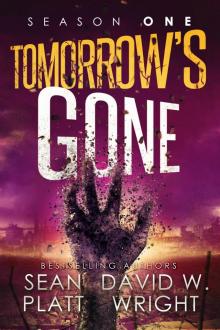 Tomorrow's Gone Season 1
Tomorrow's Gone Season 1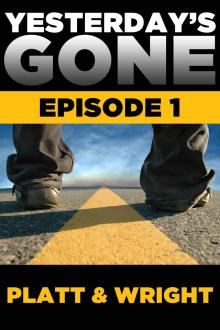 Yesterday's Gone: Episode 1
Yesterday's Gone: Episode 1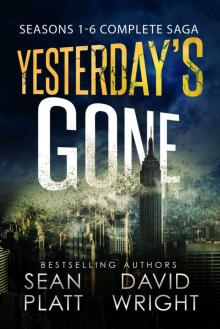 Yesterday's Gone: Seasons 1-6 Complete Saga
Yesterday's Gone: Seasons 1-6 Complete Saga The Beam- The Complete Series
The Beam- The Complete Series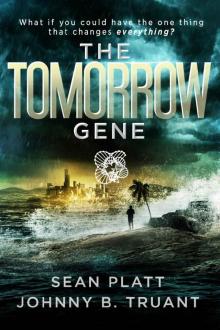 The Tomorrow Gene
The Tomorrow Gene Karma Police: Karma Police Book Two
Karma Police: Karma Police Book Two The Fall (Karma Police Book 5)
The Fall (Karma Police Book 5)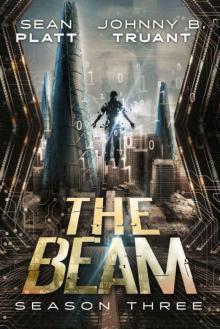 The Beam: Season Three
The Beam: Season Three Resurrection
Resurrection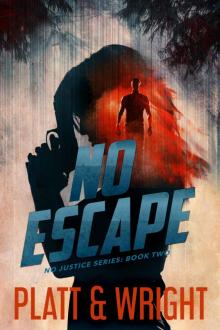 No Escape (No Justice Book 2)
No Escape (No Justice Book 2)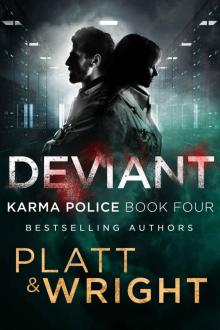 Deviant (Karma Police Book 4)
Deviant (Karma Police Book 4)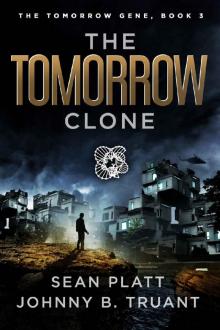 The Tomorrow Clone (The Tomorrow Gene Book 3)
The Tomorrow Clone (The Tomorrow Gene Book 3)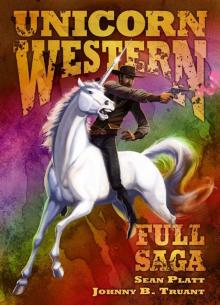 Unicorn Western
Unicorn Western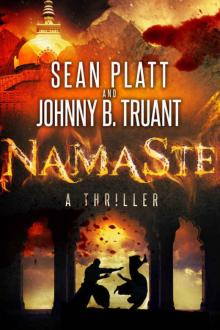 Namaste
Namaste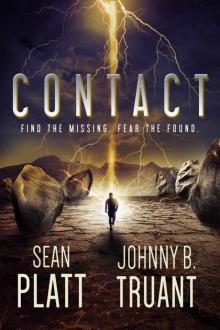 Alien Invasion (Book 2): Contact
Alien Invasion (Book 2): Contact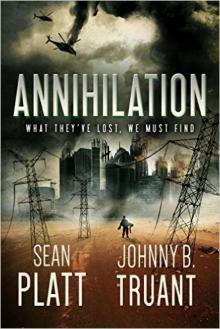 Alien Invasion (Book 4): Annihilation
Alien Invasion (Book 4): Annihilation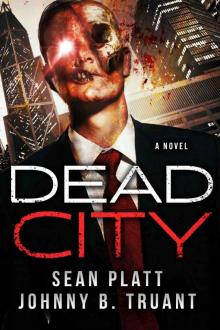 Dead City
Dead City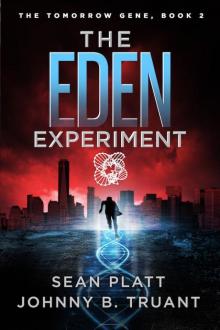 The Eden Experiment
The Eden Experiment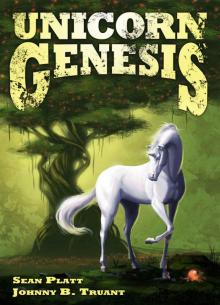 Unicorn Genesis (Unicorn Western)
Unicorn Genesis (Unicorn Western)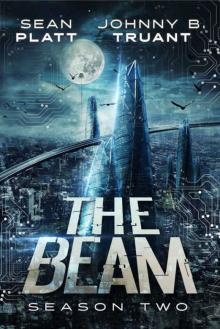 The Beam: Season Two
The Beam: Season Two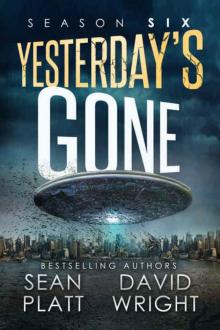 Yesterday's Gone: Season Six
Yesterday's Gone: Season Six Homecoming (Karma Police Book 6)
Homecoming (Karma Police Book 6)![[Alien Invasion 01.0] Invasion Read online](http://i1.bookreadfree.com/i1/03/30/alien_invasion_01_0_invasion_preview.jpg) [Alien Invasion 01.0] Invasion
[Alien Invasion 01.0] Invasion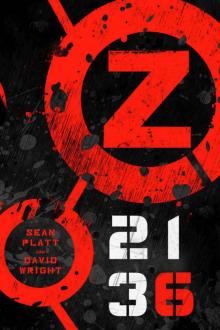 Z 2136 (Z 2134 Series Book 3)
Z 2136 (Z 2134 Series Book 3)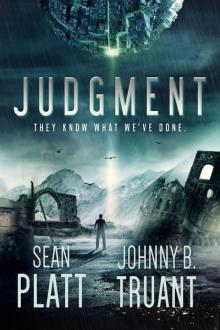 Alien Invasion (Book 5): Judgment
Alien Invasion (Book 5): Judgment Threshold
Threshold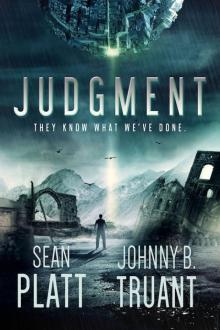 Judgment
Judgment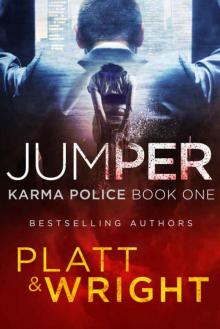 Jumper: Karma Police Book One
Jumper: Karma Police Book One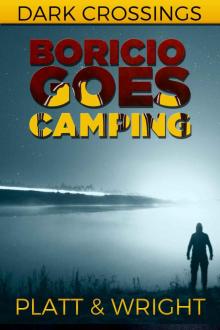 Boricio Goes Camping (Dark Crossings)
Boricio Goes Camping (Dark Crossings)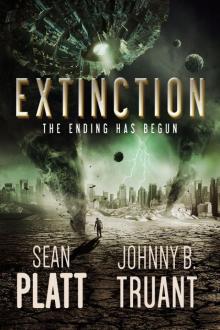 Extinction
Extinction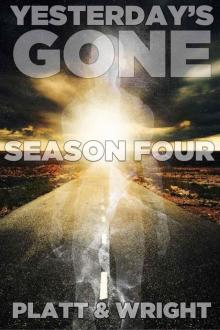 Yesterday's Gone (Season Four): Episodes 19-24
Yesterday's Gone (Season Four): Episodes 19-24![[No Justice 01.0] No Justice Read online](http://i1.bookreadfree.com/i2/04/09/no_justice_01_0_no_justice_preview.jpg) [No Justice 01.0] No Justice
[No Justice 01.0] No Justice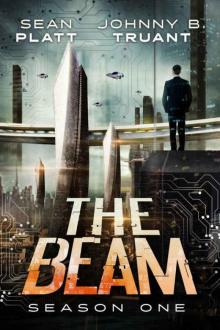 The Beam: Season One
The Beam: Season One La Fleur de Blanc
La Fleur de Blanc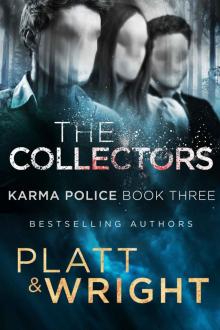 The Collectors (Karma Police Book 3)
The Collectors (Karma Police Book 3)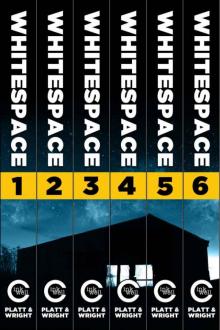 WhiteSpace: Season One (Episodes 1-6 of the sci-fi horror serial)
WhiteSpace: Season One (Episodes 1-6 of the sci-fi horror serial)